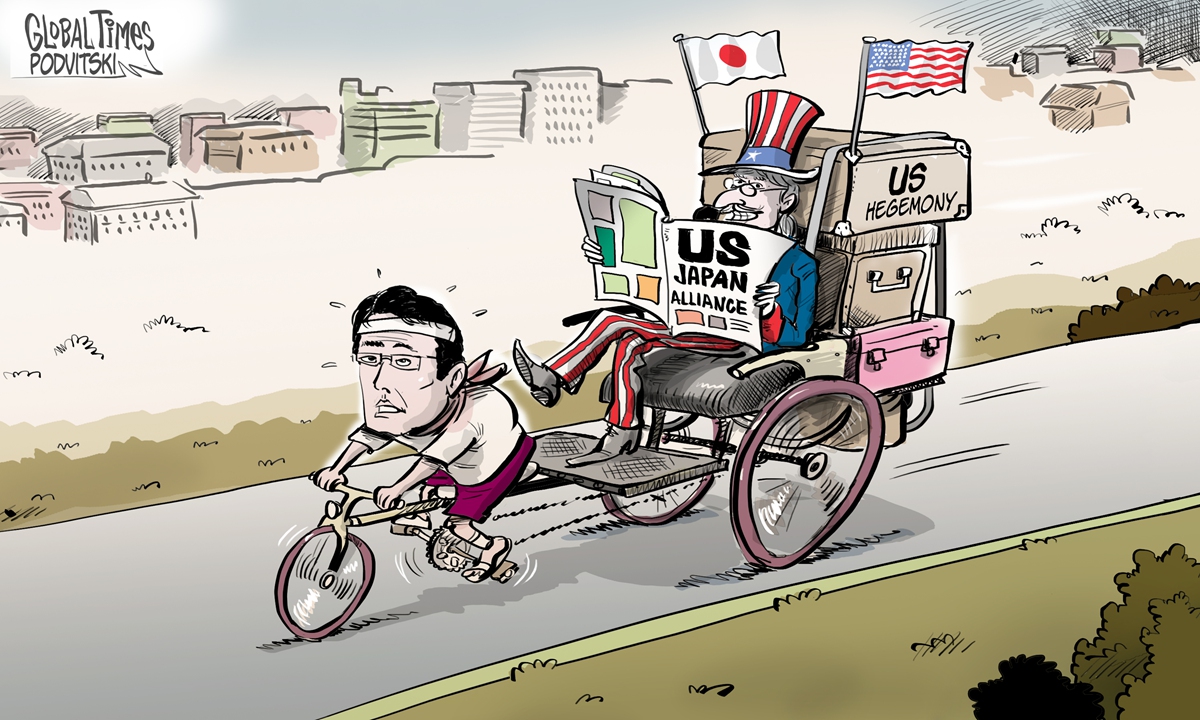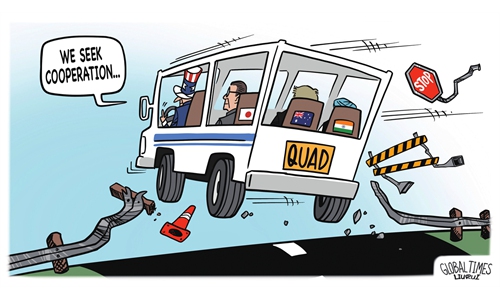Japan-Australia pact shows ‘willingness to be US pawns’, while risking regional peace

Well-trained pawn Illustration: Vitaly Podvitski
Japan and Australia signed a new bilateral security agreement covering military, intelligence, cybersecurity and space cooperation on Saturday, in a move that Chinese experts said shows the two countries' willingness to be pawns of the US, while threatening regional peace and security.
There is no mention of China in the pact, but the majority of it is apparently aimed at China, Chinese observers pointed out, noting that enhanced security cooperation between the two countries is driven by the US-led Indo-Pacific Strategy, which will only make them stepping stones for the US.
The latest move again signals that the US is trying to create a global intelligence sharing net with its allies against China. However, the US and its allies have their own calculations, and their alliance is "built on sand," so it is hard for them to contain China's peaceful development in the long run, observers noted.
The upgraded Joint Declaration on Security Cooperation, a pact first signed in 2007, was the major outcome of Japanese Prime Minister Fumio Kishida's meeting with his Australian counterpart Anthony Albanese in the west coast city of Perth, AP reported on Saturday.
Chinese observers see this new deal in the making as a sequel to a treaty signed by the two countries in January that allows military forces from both countries to train at each other's bases and to collaborate on humanitarian missions.
It is the first such agreement Japan has struck with any country other than the US. Japan announced on Saturday that its Self-Defense Forces will train and take part in exercises with the Australian military in northern Australia for the first time under the agreement, said the AP report. The new pact stressed "a rules-based order," the report added.
Such references made by Japan and Australia are widely believed to target China, as some Western politicians and media have long accused China of "breaking the rules-based order" in their narratives, and the US Indo-Pacific Strategy has long been aimed at China, observers said.
It is within expectations that the target of the new security pact has shifted compared with the previous one signed 15 years ago, as the US' strategy has changed significantly from counter-terrorism to the current Indo-Pacific, and Japan and Australia - close US allies - would definitely follow the US in playing this new game, Song Zhongping, a Chinese military expert and TV commentator, told the Global Times on Sunday.
"This showed that Japan and Australia have no diplomatic initiative or independence, and are willing to be pawns of the US," Song said.
Although the new security pact did not mention China by name, it is clear that the strengthened cooperation between Japan and Australia targets China, Chen Hong, president of the Chinese Association of Australian Studies and director of the Australian Studies Centre at East China Normal University, told the Global Times on Sunday, adding that although the pact was signed between Japan and Australia, it is clear that the important driving force is apparently the US.
Chen noted that the cooperation affirmed in the upgraded pact, which includes information sharing and space cooperation, was expanded by more than any previous agreement between the two countries.
For Japan, it is trying to highlight its status under the Quad framework, which also has the US, Australia and India as members, and seek diplomatic as well as military breakthroughs through this framework, as the Japanese government is looking to spend more on its military as a result of its rising militarism, Chen said.
Moreover, by establishing an information-sharing mechanism with Australia, Japan is a step closer to acquiring access to the Five Eyes Alliance, an intelligence alliance comprising Australia, Canada, New Zealand, the UK and the US, according to Chen.
The US has been sweet-talking Australia, saying that it is going to make Australia a world power, and China would be the "major threat," Song said.
However, the seemingly close allies have their own calculations and they are doomed to fail to unite in the long run and suppress China's peaceful development, observers noted.
Observers warned that warming military ties may not be as good for Japan and Australia as they seem.
"Both Japan and Australia are trying to hype the China threat and attempting to pull in extraterritorial countries to their small clique. But this puts regional countries on the alert and threatens regional stability," said Da Zhigang, director of the Institute of Northeast Asian Studies at Heilongjiang Provincial Academy of Social Sciences.
In response to the risks from the US-led security bloc, Song said that China should be well-prepared for any potential provocations on hot-button issues, including the Taiwan question.



